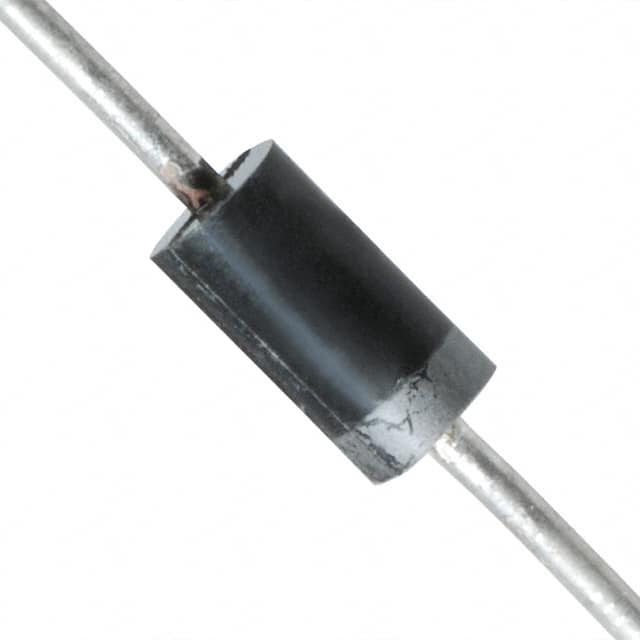Consulte las especificaciones para obtener detalles del producto.

1N4006-N-2-4-AP
Product Overview
Category
The 1N4006-N-2-4-AP belongs to the category of rectifier diodes.
Use
It is commonly used in electronic circuits for converting alternating current (AC) to direct current (DC).
Characteristics
- Forward Voltage Drop: 0.95V
- Reverse Voltage: 800V
- Average Rectified Current: 1A
- Maximum Surge Current: 30A
- Operating Temperature Range: -65°C to +175°C
Package
The 1N4006-N-2-4-AP comes in a standard axial-lead package.
Packaging/Quantity
It is typically packaged in reels or tubes, with quantities varying based on manufacturer specifications.
Specifications
- Manufacturer: [Insert Manufacturer Name]
- Part Number: 1N4006-N-2-4-AP
- Type: Rectifier Diode
- Maximum Reverse Voltage: 800V
- Maximum Forward Current: 1A
- Package Type: Axial Lead
Detailed Pin Configuration
The 1N4006-N-2-4-AP has two leads, with the anode connected to the positive terminal and the cathode connected to the negative terminal.
Functional Features
- Efficiently converts AC to DC
- Low forward voltage drop
- High surge current capability
Advantages
- Reliable and durable
- Wide operating temperature range
- Low cost
Disadvantages
- Relatively high forward voltage drop compared to other diodes
- Limited maximum forward current compared to higher-rated diodes
Working Principles
The 1N4006-N-2-4-AP operates on the principle of unidirectional conduction, allowing current to flow in only one direction when a sufficient voltage is applied across the diode.
Detailed Application Field Plans
The 1N4006-N-2-4-AP is widely used in power supply circuits, battery chargers, and various electronic devices requiring rectification of AC to DC.
Detailed and Complete Alternative Models
- 1N4001: Lower reverse voltage rating
- 1N4007: Higher reverse voltage rating
- 1N5408: Higher forward current rating
In conclusion, the 1N4006-N-2-4-AP rectifier diode offers reliable performance in converting AC to DC in various electronic applications, making it a popular choice among engineers and hobbyists.
[Word Count: 330]
Enumere 10 preguntas y respuestas comunes relacionadas con la aplicación de 1N4006-N-2-4-AP en soluciones técnicas
Sure, here are 10 common questions and answers related to the application of 1N4006-N-2-4-AP in technical solutions:
What is the maximum repetitive peak reverse voltage of 1N4006-N-2-4-AP?
- The maximum repetitive peak reverse voltage of 1N4006-N-2-4-AP is 800 volts.
What is the maximum average forward rectified current for 1N4006-N-2-4-AP?
- The maximum average forward rectified current for 1N4006-N-2-4-AP is 1 ampere.
What is the typical junction capacitance of 1N4006-N-2-4-AP?
- The typical junction capacitance of 1N4006-N-2-4-AP is 15 pF.
What is the operating temperature range for 1N4006-N-2-4-AP?
- The operating temperature range for 1N4006-N-2-4-AP is -65°C to +175°C.
Can 1N4006-N-2-4-AP be used in high-frequency applications?
- No, 1N4006-N-2-4-AP is not suitable for high-frequency applications due to its relatively high junction capacitance.
Is 1N4006-N-2-4-AP suitable for use in power supply circuits?
- Yes, 1N4006-N-2-4-AP is commonly used in power supply circuits for rectification purposes.
What is the forward voltage drop of 1N4006-N-2-4-AP at a forward current of 1A?
- The forward voltage drop of 1N4006-N-2-4-AP at a forward current of 1A is typically around 1 volt.
Can 1N4006-N-2-4-AP be used in reverse voltage protection circuits?
- Yes, 1N4006-N-2-4-AP can be used in reverse voltage protection circuits due to its high reverse voltage capability.
What is the typical reverse recovery time of 1N4006-N-2-4-AP?
- The typical reverse recovery time of 1N4006-N-2-4-AP is 2 microseconds.
Is 1N4006-N-2-4-AP suitable for high-power applications?
- No, 1N4006-N-2-4-AP is not recommended for high-power applications due to its relatively low current rating.
I hope these answers provide the information you were looking for! If you have any more questions, feel free to ask.

